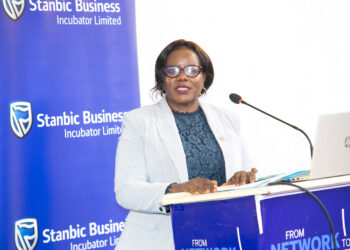Uganda Development Bank (UDB) has unveiled an all out inclusive and convenient strategy to provide financing for Small and Medium Enterprises (SMEs) which will help them grow into viable entities.
This impressive strategy was elaborated at length by the Chief Executive Officer (CEO) for UDB Ms. Patricia Ojangole during a press briefing that took place on the sidelines of the 7th edition of the Africa SME Champions Forum, which started yesterday at Speke Resort Munyonyo.
The two-day event hinged on the theme “Recovery is Growth” was co-hosted by the Arab Bank for Development in Africa (BADEA) and empowered by Afric Earch. It brought together more than 300 of Africa’s top SMEs, institutional funding organizations, venture capitalists, angel investors and ecosystem builders.
Ms. Ojangole said UDB not only provides funding for SMEs but also has put in place favorable programs and requirements so that these ventures can grow, including nurturing them to flourish from small to medium and medium to large.
“Every investor that comes to Uganda has where to start from because Ugandans are so innovative. Our approach is to make sure that SMEs survive. We have put in place both financial and non financial interventions accross all value chains to support SMEs,” Ojangole remarked.
She highlighted that SMEs are key drivers in fostering innovation, wealth creation and job creation in Uganda, employing over 8.5 million citizens which account for approximately 95% of the entire private sector generating over 75% of the country’s Growth Domestic Product (GDP).
Besides, she plainly explained that capitalizing on ensuring profitability, sustainability and scalability of small businesses is a crucial step towards ensuring national development, which is in tandem with Uganda’s National Development Plan III that is to say; transforming the nation from peasant to modern and prosperous society.
“SMEs operate across all sectors you can think of in the economy, agriculture, manufacturing, value addition, services and now we are seeing a lot of innovation especially around ICT, the creatives etc and constitute largely youth in the country. Then Uganda is recognised as one of the country with the highest levels of innovation entrepreneurship but also characterized by a lot of high business birth rate with the lowest number of survival.”
It is important to point out that high attrition rates for SMEs in Uganda is not limited to just lack of access to adequate funding, and this is the major focus for UDB.
It goes on to include lack of advisory and business development support services , inefficient governance and financial management practices, inadequate adoption of technology to scale, inadequate access to expertise, and understanding these challenges lays ground for an action plan to ensure sustainability of SMEs.
“It is important to understand what are the specific issues or challenges that make these businesses not to survive. So as response to that and our ultimate objective is to make sure as many SMEs survive,” said Ojangole.
In harmony with the above cut-throat challenges, UDB launched specific segments and products for SMEs dubbed financial and non financial interventions, aimed at circumventing such bottlenecks.
Financial interventions are majorly focused on addressing issues of funding to ensure that funds are available at affordable terms which are commensurate with operations of these SMEs.
With non financial interventions, UDB looks at building the capaciy of SMEs so that when this is accomplished, funds are availed to them with hope that they are mature enough to practice best financial management practices hence enablig more survival rates.
The Africa SME Champion Forum, a major annual event tailored towards the growth of African companies was launched during the Dakar edition in Senegal in 2014. It resumed yesterday after a halt in 2019, due to the outburst of the Covid-19 Pandemic.
Do you have a story in your community or an opinion to share with us: Email us at editorial@watchdoguganda.com













